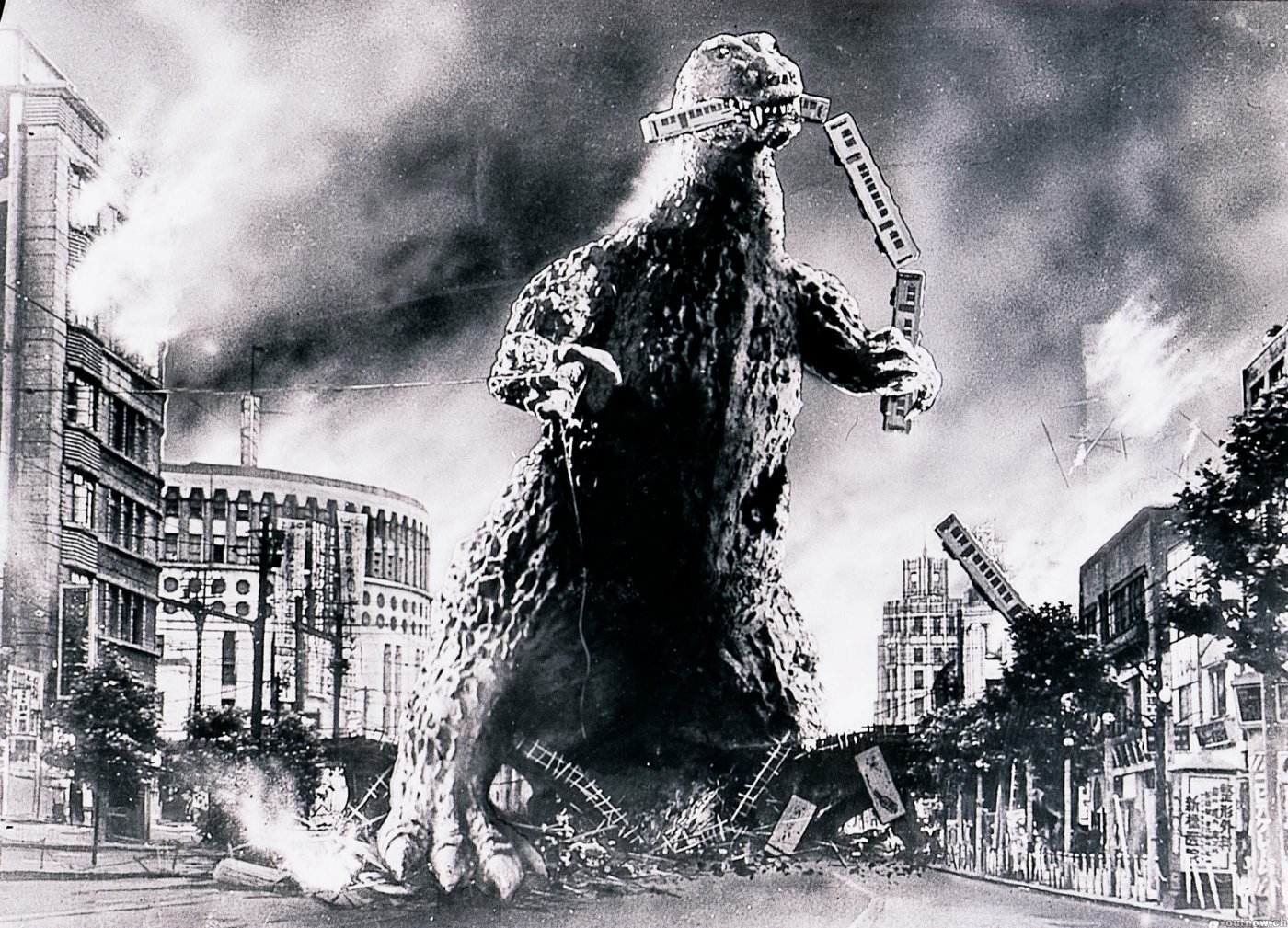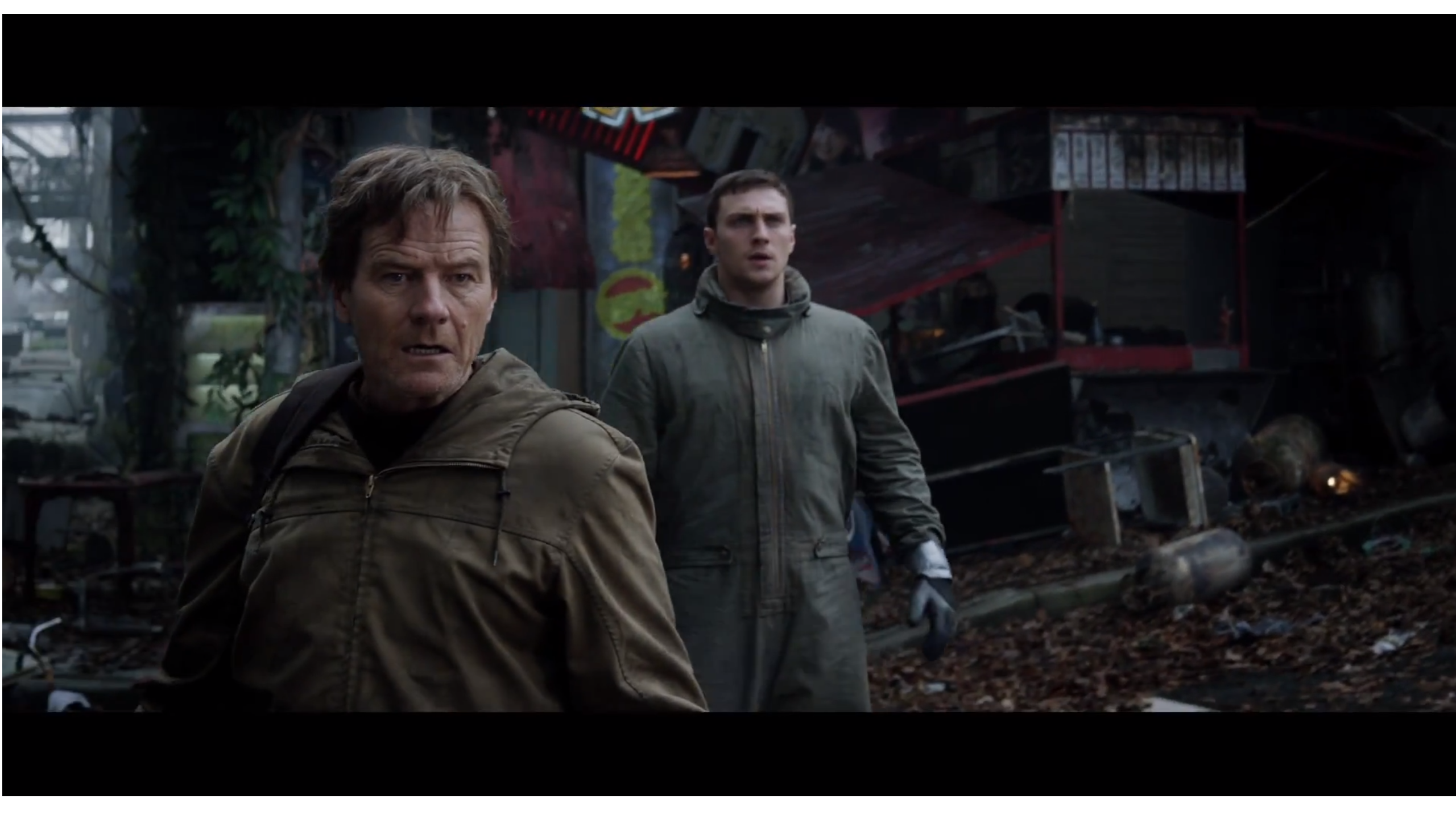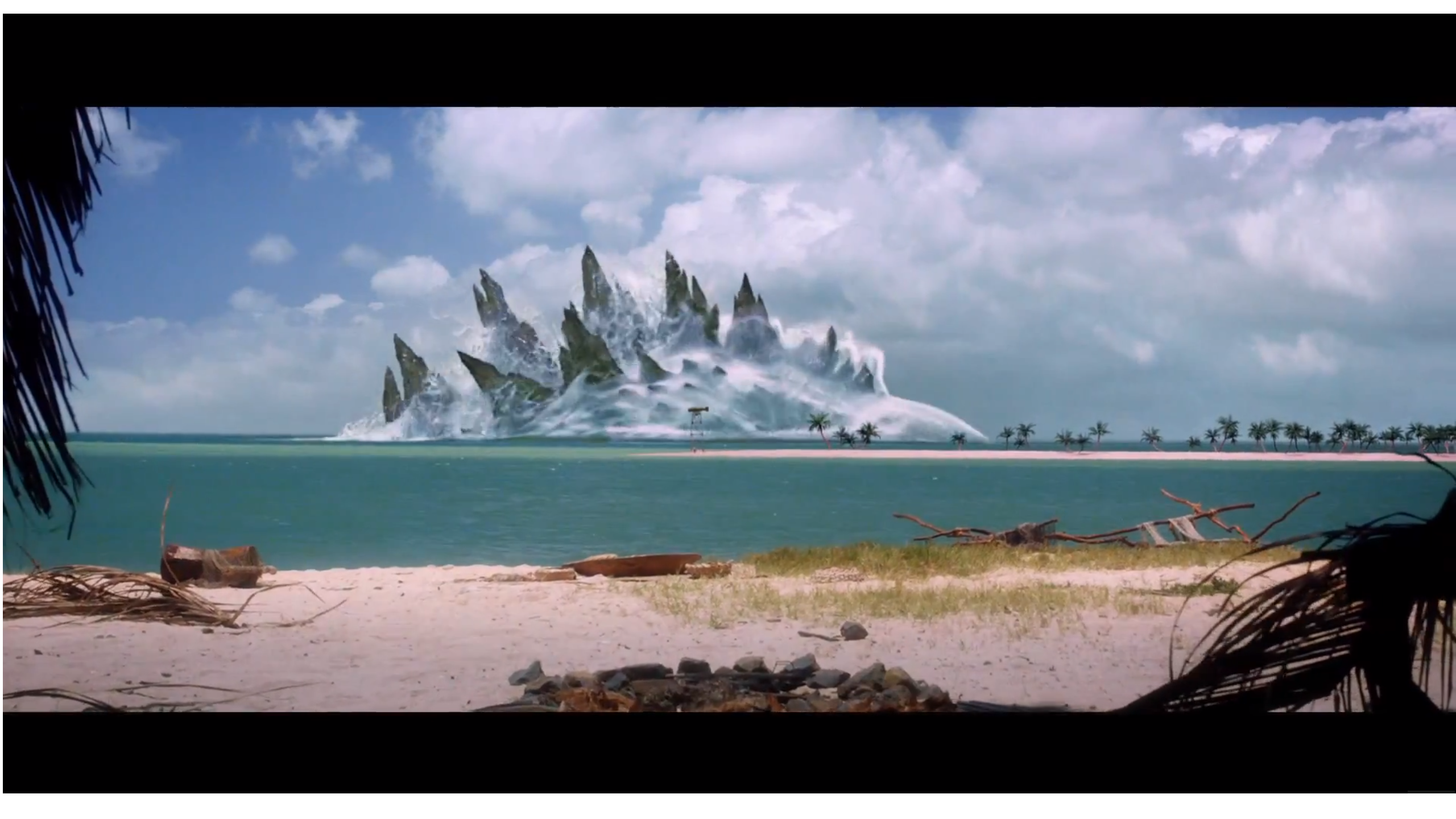We’ve now seen the first and second trailers for Gareth Edwards’ Godzilla. As a Godzilla fan from a young age, I’m excited to see a new film in the series for the first time in 14 years. I haven’t been following Edwards’ videos and diaries and breakfast menus, like many other diehard fans have. I haven’t even yet seen Edwards’ debut film Monsters. I might not be up on the latest half-second of info or script spoilers (deliberately). But I would like to share with you my hopes and thoughts on the project as it appears to stand at this point.
From the start, Edwards’ task was analogous to that of Peter Jackson’s in 2005, who had to disparage some other guy’s remake of King Kong while promoting his own. Edwards is positioning his movie, implicitly and explicitly, as the opposite of the staggeringly unpopular 1998 Godzilla. His cast includes Ken Watanabe as Dr. Serizawa, the most recognizable human character in the classic Godzilla series. At least one old Godzilla cast veteran, Akira Takarada, has filmed a cameo. The official posters and trailers depict the title of the movie in English and in Japanese. While the bulk of the characters and locations seem to be American, the character of Godzilla is connected with his metaphorical Japanese roots. Even the choice of San Francisco as the central location of the film recognizes that city’s role as a port for Japanese immigrants. On the other hand, 1998 Zilla was a French lizard who attacked New York.
Clearly, in another departure from 1998, the devastation is to be utterly apocalyptic. It’s the digital age: 2014 Hollywood can destroy the world more thoroughly than the traditional effects used in previous Japanese productions ever could. In the latest trailer, Bryan Cranston’s panicked voice makes it clear that civilization itself hangs in the balance. Believe it or not, this is unusual for a kaiju movie. In the original Godzilla and its early sequels, the beast is a great threat, but there’s no question of it doing anything other than making occasional, ultimately predictable landfalls. Eventually, in later sequels, Godzilla enters a semi-benign coexistence with humans. Aside from some aliens vaguely threatening human civilization (as they do) there was no sense of the stakes truly being Armageddon in the old series.
However, like any other genre, kaiju films must adapt to the times. 9/11 drastically altered how audiences reacted to destruction. Now we know what it looks like when the biggest building in a city falls…blinding dust, choking poison, pain and fear. In 2001 the last truly horrifying Godzilla film, Godzilla/Mothra/King Ghidorah, was released. It was never considered for an American theatrical run. That is no coincidence. Godzilla and Gamera limped on in Japan for just another few years after that, and even these films were relatively lighthearted. The Godzilla franchise survived in the US as a series of three video games that heavily emphasized comedy, and other kaiju projects were restricted on both sides of the ocean to nostalgic indies and broad spoofs.
Even the 1998 Zilla, predating 9/11, was informed by attention to “realism.” If Zilla utterly destroyed New York, the filmmakers couldn’t have maintained their winking, jokey ’90s tone. So the creature was reduced to a scaled-up version of a troublesome pet iguana. Most of the destruction is caused by incompetent military personnel, a bit of satire that didn’t make much impact and is terribly at odds with other Godzilla movies (the military may be ineffective but ALWAYS competent and brave…a la Spielberg’s War of the Worlds).
Tellingly, the first significant giant monster movie in Hollywood last decade was Cloverfield, which punched up the horror more than almost any other kaiju film. Scenes of buildings crumbling and landmarks defaced were very influenced by 9/11 news coverage, and not played as cutesy or fun at all. Cloverfield was also famous for its cryptic viral marketing campaign, which this new Godzilla is borrowing heavily from. (Unfortunately the two-year-long refusal of the marketing campaign to unveil a completely clear look at Godzilla invites comparisons to the infamous 1998 campaign as well.)
Cloverfield got away with the horror elements by being about a new monster. But there is danger in playing an old hand of monster cinema for new scares. Witness Universal’s pathetic attempts to get their icons of horror into new movies every few years. Jackson’s Kong understood this, and played for spectacle, nostalgia, and the weight of inevitable tragedy–you weren’t scared of Kong, only for him. Godzilla, however, will have to be incredible to play the titular monster as a force of terror. I just saw the film’s masterful teaser again, and one of my fellow theater-goers let out a guffaw when the title card came up. Attracting and satisfying a broad audience who’s seen it all is not easy.
Perhaps the only film yet to perfectly balance the horrific, exciting, and funny aspects of the kaiju genre was Guillermo del Toro’s tour de force Pacific Rim. After establishing the peril and destruction with a dark first act, del Toro then gradually weaves in fantastical elements (i.e. Charlie Day and Ron Perlman) and then jams up the fun factor for the knock-down drag-out centerpiece battle in Hong Kong. Del Toro plays his audience like a symphony and delivers a satisfying experience, in which apocalypse is threatened but ultimately averted.
With Pacific Rim, now a franchise, expertly staking its claim to a middle ground of laughs and chills, where is there for Godzilla to go? There are roughly two schools of thought among kaiju fans. One camp tends to prefer…camp, thinking of kaiju as cartoony, their fights as wrestling matches, and the city as the ring. Since physics make kaiju thoroughly impossible anyway, they say, you might as well ditch realism. Many fans fondly remember movies with a menagerie of battling creatures like Destroy All Monsters, and they do not expect photo-realism anymore than they would expect it in, say, live theatre. Think Batman 1966.
The other camp feels that the success of the somber 1954 classic Godzilla is not necessarily unique, and that kaiju can be taken as seriously as any other sci-fi concept. But only, the theory goes, if the producers commit to the reality of the concept. The audiences WILL be amazed, they might say, if the product is simply good enough. Think The Dark Knight.
Of course, just like Batman fans, most kaiju fans aren’t pure devotees of one camp or another. And since this Godzilla may be the last gasp of the franchise in years if it doesn’t make back its mega-budget, there’s a lot of nail-biting and navel-gazing going on. Is a campy take on Godzilla going to doom the once-relevant franchise to frivolity forever? Are audiences going to be sick of the umpteenth “Chris Nolan-style” reboot of a once-silly property? And the whole question is complicated by the fact that 1950s Godzilla was a grim and devastating social critique, but 1960s Godzilla was a swaggering wrestler who fought King Kong and danced on screen. No one can agree on what “the” classic Godzilla is…only on what it isn’t (cough 1998 Zilla).
The teaser and trailer, not to mention Edwards’ own testimony, firmly declare that his Godzilla will in fact be played straight as an arrow. The “Nolan” camp seems to have totally prevailed. While other creatures are present for brawling–a concession to fans who believe fighting is integral to the genre–Godzilla himself is clearly the major threat to our way of life, and the film will critically examine our culpability in creating him.
There are friends of mine who, I state without exaggeration, have been waiting for this movie all their lives. I hope it’s everything that they have been waiting for. Yet I, sadly, remain a little skeptical. It’s a tall order.
First of all, the movie has set its own stakes very high. It can only be a masterpiece or a laughingstock. There’s no room to say “it’s just a show, you should really relax.” The movie demands to be taken seriously, and you can’t demand that everyone take “Walter White vs. Godzilla” seriously. We’re too jaded.
Second, even if it is a masterpiece, too much “realistic” destruction risks being enervating. You don’t want audiences to walk out of the theater feeling glum. Pacific Rim avoided this by having the vast majority of the death and destruction in an opening montage, but Godzilla seems like it’s taking the opposite arc. Something needs to pay off all this catastrophe. That’s why Optimus Prime kills the villains at the end of Transformers: Dark of the Moon, because we earlier saw them vaporize hundreds of innocent people. That’s why Independence Day doesn’t end with a peace treaty, and why Darth Vader doesn’t get a happy ending.
Which leads to the third issue, the film has limited its own story space if it makes the threat of Godzilla too extreme. If Godzilla threatens humanity itself, then the only responsible thing to do is to kill him. I don’t think that the producers are going to kill off Godzilla (why kill the goose that lays golden sequels) but if he kills millions of people himself, he’s going to seem like he deserves it. You can’t think that about Godzilla. You don’t go to a Frankenstein film rooting for the Monster to die, because we made him and we are responsible for his problems. Godzilla is the same. Edwards seems like he understands this problem, alluding to the “force of nature” approach to Godzilla many of the Japanese films took. But it’s a tricky balance to get right. Godzilla must seem as impersonal as a hurricane, and yet as noble as a great lion, to be able to kill humans without the audience demanding retribution.
Finally, and this is more a personal thing, but it’s clear now that the plot revolves around some kind of governmental conspiracy. The whole idea of a conspiracy that successfully covers up a 300 foot monster is…dumb. It’s also really played out. Lately the more interesting Hollywood sci-fi plots have gone in different directions, involving the public from the start, like Robocop and Man of Steel. Setting that aside, government conspiracy is a weird fit for the genre. Philosophically it clashes with the ideals of Ishiro Honda, the first Godzilla director, who was fascinated by the idea of nations banding together in mutual trust to defend against impossible threats. Honda’s optimism about human nature was perhaps rivaled only by Gene Roddenberry himself. In fact NO government cover-up was ever used as a plot element in ANY classic kaiju film, which is simply incredible given that it is such a stock Hollywood plot. (Of course, being something of a stock Hollywood plot, there is one in 1998 Zilla, and subsequently over in Japan 1999’s Gamera 3 and 2003’s Godzilla: Tokyo SOS depicted shadowy government cabals. Conversely, Pacific Rim eschews this and feels more like an Ishiro Honda film than any other in decades.)
But hey, at the end of the day, these are quibbles. I’m very excited that Godzilla’s getting the big-budget treatment. I LOVE the design of the beast (what I’ve seen of it so far) and it already looks like the CGI is allowing him to be as expressive as I’ve always imagined him to be. I couldn’t be more enthused for the cast, and the professionalism and enthusiasm they are showing in interviews is out of this world. I’m shaking with excitement.
I just want Godzilla to be good. And more than that, I want Godzilla to be on top of the world, not just in his own movies but at the box office. Cause he’s 60 years old, he’s changed the world, and he damn well deserves it.




